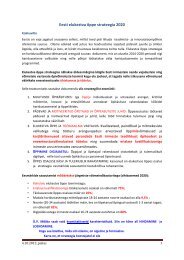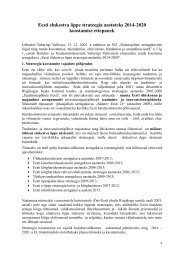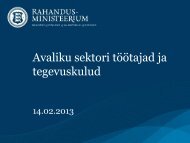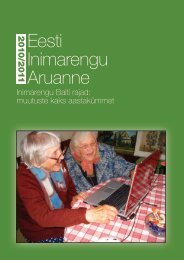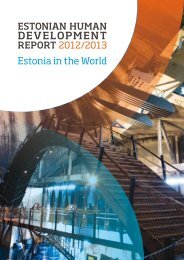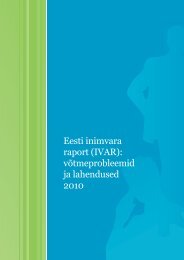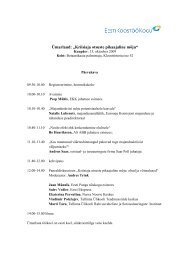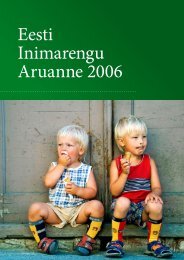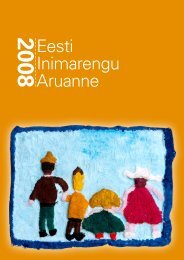Estonian Human Development Report
Estonian Human Development Report - Eesti Koostöö Kogu
Estonian Human Development Report - Eesti Koostöö Kogu
You also want an ePaper? Increase the reach of your titles
YUMPU automatically turns print PDFs into web optimized ePapers that Google loves.
Table 3.2.6. Agreement with statements expressing<br />
alienation from society (responses “completely<br />
agree” or “sooner agree than disagree” by ethnicity,<br />
place of residence, and age group (%))<br />
I do not look at the<br />
future hopefully<br />
My contribution is<br />
not recognized<br />
I feel that I am a second-rate<br />
member of<br />
the society<br />
Place of<br />
Ethnicity<br />
residence<br />
Total <strong>Estonian</strong><br />
Russian<br />
City<br />
Rural<br />
area<br />
Source: Integration of <strong>Estonian</strong> Society: Monitoring 2008.<br />
Age group<br />
15–2425–3940–59 60–75<br />
21.1 18.6 26.1 23.8 15.5 9.5 12.6 24 40.3<br />
23.5 19.3 32 25.9 18.6 20 19.8 23.9 32.4<br />
26.3 22 35.1 28.8 21.3 15.8 19.8 28.2 42.4<br />
People look down<br />
on me due to my low 13.8 10.8 19.7 16.2 8.8 9.2 8.4 15.2 23.5<br />
income or occupation<br />
I feel that I have<br />
“missed the boat”<br />
I do not have the<br />
opportunity to influence<br />
society<br />
I am unable to protect<br />
my interests<br />
22.5 18.9 29.4 23.8 19.6 6.4 14.5 28.6 39.4<br />
63.3 57.8 72.3 65 59.8 44.6 55 70.8 79.2<br />
25.7 16.4 44.5 30.2 16.3 13.2 18.1 27.3 53.3<br />
although the percentage of those who are very interested<br />
in politics is higher among <strong>Estonian</strong>s.<br />
General trust in national institutions has been steadily<br />
low in 2004–2008. On a scale of 1–10 (1 meaning having no<br />
trust at all and 10 meaning having full confidence), confidence<br />
in the Riigikogu has fluctuated between 4.2 and 4.6<br />
points during this period, while confidence in the judicial<br />
system has increased over the years (4.9 in 2004 and 5.3 in<br />
2008) and confidence in the police has remained the same<br />
(5.6 points). Although the trust of <strong>Estonian</strong>s in the national<br />
institutions has grown in comparison with the overall<br />
average, the opinions of the Russian-speaking population<br />
have become increasingly negative when measured on the<br />
same scale (Figure 3.2.5.), pointing to a polarization process<br />
that is affecting the society (see also Trumm & Kasearu<br />
2008). In 2004 and 2006, people with a higher education<br />
expressed greater confidence in institutions, but the<br />
differences have grown smaller by 2008. Trust also wanes<br />
as people grow older (younger people have more trust in<br />
institutions than older respondents). Younger respondents<br />
also attribute more value to social cohesion and are ten per<br />
cent less likely to think that society would function better<br />
if everyone were to take care of themselves.<br />
Subjectively perceived alienation (withdrawal) from society.<br />
Previous surveys have shown that subjective assessments<br />
of one’s economic situation and success are more<br />
important as indicators of well-being than the actual situation<br />
(see Kasearu & Trumm 2008). This allows us to consider<br />
that subjective assessments of one’s situation may have<br />
a more significant effect on the general quality of life than<br />
the real situation itself. Dissatisfaction with one’s life, way<br />
of life, living conditions and quality of life in general may<br />
more likely be an outcome of perceived withdrawal from<br />
society than an assessment of actual living conditions.<br />
In 2006, 14% of Estonia’s population claimed that they<br />
belong to a group that is discriminated against in the society.<br />
Ethnicity and language were reported as the primary<br />
bases for discrimination, meaning that discrimination<br />
was experienced most frequently by Russian-speakers and<br />
people with a higher education.<br />
Perceived withdrawal from society was measured<br />
through seven statements (Table 3.2.6.). The table provides<br />
the percentages of respondents agreeing with the statements<br />
by ethnicity, place of residence and age group. The absence<br />
of opportunities and the resulting lower quality of life can<br />
be viewed from the standpoint of future expectations. The<br />
percentage of people pessimistic about their future has<br />
decreased from 32% in 2006 to 24% in 2008. <strong>Estonian</strong>s, residents<br />
of rural areas, people with a higher education and<br />
younger people tend to be more optimistic. The most significant<br />
source of dissatisfaction for the residents of Estonia<br />
is the absence of opportunities to influence social processes<br />
and a quarter of the respondents feel that they are underpriviledged<br />
members of the society and are unable to protect<br />
their interests. Studies reveal that living in rural areas<br />
decreases the likelihood of withdrawal: the number of people<br />
who feel that they are unable to protect their interests<br />
and that they are looked down upon due to their low income<br />
is two times lower among people living outside of urban centres.<br />
The feeling of being alienated is closely related to age<br />
(Table 3.2.6.). Older people were considerably more likely to<br />
agree with statements that measured alienation and nearly<br />
80% of people aged 60–75 stated that they do not have<br />
the opportunity to influence society. One fifth of younger<br />
respondents were of the opinion that the society and fellow<br />
citizens do not recognize their contributions but were<br />
also quite optimistic, with less than 10% of young people<br />
claiming to have “missed the boat”. Among middle-aged<br />
people, however, there is a common fear of being a second-rate<br />
person who has not been able to keep up with the<br />
changes occurring in society. Comparisons between countries<br />
(Böhnke 2008) have shown that among EU states, Baltic<br />
countries exhibit the highest rate of perceived alienation<br />
from society and the least connection between a people’s<br />
withdrawal and their socio-economic position.<br />
Compared to the <strong>Estonian</strong>-speaking population, a much<br />
higher percentage of the Russian-speaking population feel<br />
alienated, but the most important difference becomes clear<br />
when we look at the perceived ability to protect one’s interests.<br />
The fact remains that there are 28% more Russianspeakers<br />
than <strong>Estonian</strong>-speakers who feel that they are<br />
unable to protect their interests (Table 3.2.6.). At the same<br />
time, the data of the 2006 European Social Survey indicate<br />
that, surprisingly, the percentage of those who feel that they<br />
are unable to manage their own life is higher among <strong>Estonian</strong>s<br />
compared to Russian-speakers. Thus, <strong>Estonian</strong>s are<br />
more likely to consider their lack of success a result of their<br />
personal problems, while the Russian-speaking population<br />
sees structural reasons related to the organization of the<br />
society as one of the sources of their failures. For example,<br />
22% of <strong>Estonian</strong>s and 46% of Russian-speakers believe that<br />
compared to the Russian-speaking population, <strong>Estonian</strong>s<br />
have better opportunities for self-expression and engaging<br />
in creative processes, and 39% of the Russian-speaking population<br />
agreed with the statement that they have very few<br />
opportunities to show how capable they are, while among<br />
<strong>Estonian</strong> respondents, the rate of agreement with this statement<br />
was twice as low.<br />
For further analysis related to perceived alienation<br />
a composite alienation index was created by combin-<br />
| 62



